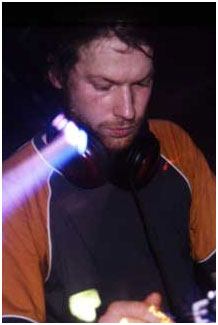
An Introduction To The Music Of Aphex Twin
Richard D. James was born on August 18, 1971, in Cornwall, England. As a child, Richard was fascinated with sound. Fascinated in a way that most musical prodigies aren't, or as he may come to represent a new precedent, didn't used to be. He wasn't only interested in the standard definition of music per se(i.e. harmonies, melodies, conventional structures, etc.), but also in the otherworldy textures possible to create through technology.
Experimenting with computers, sequencers, keyboards and reel-to-reel tape, he was inventing his own synthesizers by the age of thirteen, and recording his own material by, at most, the age of fourteen, if not sooner. Throughout his teens, he created hundreds of electronic works, purely for his own pleasure. As he grew, he held several menial jobs, including ditch digging.
But he no doubt kept the dream alive that he would one day be a professional musician. And indeed, he had begun to D.J. in his home town, garnering serious attention.
In 1991, at the age of 20, his first recording was released. It was called "Analogue Bubblebath" and was a collaboration between him and a friend, Tom Middleton, under the name AFX(subseqent AFX releases were done by James alone) and was very well received critically, and more importantly, in the all-powerful dance clubs of England, who had never heard anything quite like the four song E.P. In 1992, he released his first full-length recording, under the name Aphex Twin. And it is a recording which should have changed music history, and was critically hailed, making many critics' annual top ten lists. The name of it was "Selected Ambient Works "85-92", and featured many recordings he had done as a teenager. As the nineties progressed, he
took on many different psuedonyms, including Polygon Window, Caustic Window and GAK. This added to his already mysterious persona, built on such things as owning an army tank and driving it around the countryside, and playing a gig once using only sandpaper, a food mixer, a microphone and a record player. These antics petrified some, while intriguing others. All the while, his reputation grew, enhanced by his prolific output: able to record four to five songs a day, and releasing multiple albums during a year. He was known almost as well for his live shows and D.J. gigs, sometimes receiving standing ovations,and in the mid-nineties, touring with Bjork. And in the
midst of all this, he still had time to co-found a record label, Rephlex, and record re-mixes for dozens of artists, including Beck and Nine Inch Nails. As the nineties began to come to a close, he - strangely enough - seemed to grow weary of possible stardom. Not long after his video "Come To Daddy" was receiving considerable airplay, he announced that he was considering retiring, and instead, focusing on running the record label, and recording only for himself, once again. He has proved this to be true, releasing very little new material in the last four years.
Aphex Twin's music may be described simply as fusing highly imaginative, emotional electronic music with a decidedly experimental edge, but this only begins to describe it. Aphex Twin is one of the great unheralded genuis' of our time, easily as important to electonica/techno as the Beatles are to rock, as Miles Davis and John Coltrane are to Jazz, and as Mozart and Stravinsky are to classical. In fact, Aphex Twin has been compared to Mozart. He has claimed that his major influence is Karlheinz Stockhausen's first record, and bears little resemblance to anyone else. He can be hard and abrasive, soft and beautiful, or incomparably experimental, sometimes all at once. He has pop(softer tracks)and rock(harder tracks)appeal, and
demonstrates the complexity of traditional classical and the minimalism of modern classical, while retaining the freedom of structure of jazz. Why this man isn't a household name is a wonder to me. Never marketed to a high degree, no one deserves to be heard more than Aphex Twin. I promise that if you have an open mind and love great music, Aphex Twin will reward you with a listening pleasure like none you have ever experienced. Your heart, mind and body will merge, and you will realize that you are in the presence of a one-of-a-kind genius.
I hope that I have convinced you to at least give Aphex Twin a try. I would recommend the following four albums as starting points, preferably the first two.
"Selected Ambient Works 85-92" - (Do not confuse this with Selected Ambient Works Vol. 2) This is an out-of-print import album, but if you can find it, its well worth the twenty bucks(or more) you will have to spend on it(because its an import). This is undoubtedly the best introduction to Aphex Twin. It features some of the most lovely electronic music ever recorded, easily as important as The Beatles' "Sgt. Pepper's Lonely Hearts Club Band", Miles Davis' "Kind Of Blue", or Stravinsky's "The Rite Of Spring". This is available at some stores, but you may have to order it there or on-line.(More info at the bottom).

"...I Care Because You Do" - If you can't find the previously mentioned album, this is the next best thing, and shows more breadth of style than just about any of his releases, while maintaining a remarkable consistancy.
Hard, soft, experimental; its all on this one. It's a great album too, though perhaps not as classic as "85-92". It's available at most stores, or they can order it.
"Richard D. James Album" - This is Aphex's foray into jungle, and would be a good starting point, if you absolutely can't find the other two, and features some of his most pop-oriented music. Leave it to Richard to redefine jungle in his own image. It is widely available, as well.
"Selected Ambient Works Vol. 2" - The reason you don't want to confuse the two, is that besides the title, they have very little in common. The first release is beauty personified, while this one features dark, experimental, mimimalist techno. It's sort of anti-new age music. Artistically, its one of his most important releases, but is not a good starting point for the unitiated. I would definitely wait to purchase this one, until you've at least have time to listen to one of the others mentioned.
Other - Beyond that, feel free to dive in once you know you like him. There are dozens of his brilliant releses out there, waiting for your
appreciation.
I hope you enjoy this revolutionary artist. Happy listening!!
Copyright Brian Lackey 2001.
Used by permission.